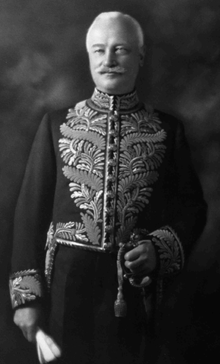Esioff-Léon Patenaude
| The Hon. Esioff-Léon Patenaude | |
|---|---|
 | |
| 17th Lieutenant Governor of Quebec | |
|
In office April 29, 1934 – December 30, 1939 | |
| Monarch |
George V Edward VIII George VI |
| Governor General |
The Earl of Bessborough The Lord Tweedsmuir |
| Premier |
Louis-Alexandre Taschereau Adélard Godbout Maurice Duplessis |
| Preceded by | Henry George Carroll |
| Succeeded by | Eugène Fiset |
| Member of the Canadian Parliament for Hochelaga | |
|
In office October 15, 1915 – December 17, 1917 | |
| Preceded by | Louis Coderre |
| Succeeded by | Joseph Edmond Lesage |
| Member of the Legislative Assembly of Quebec for Laprairie | |
|
In office June 8, 1908 – October 15, 1915 | |
| Preceded by | Côme-Séraphin Cherrier |
| Succeeded by | Wilfrid Cédilot |
| Member of the Legislative Assembly of Quebec for Jacques-Cartier | |
|
In office February 5, 1923 – October 8, 1925 | |
| Preceded by | Joseph-Séraphin-Aimé Ashby |
| Succeeded by | Victor Marchand |
| Personal details | |
| Born |
February 12, 1875 Saint-Isidore, Quebec |
| Died |
February 7, 1963 (aged 87) Montreal, Quebec |
| Resting place | Notre Dame des Neiges Cemetery |
| Nationality | Canadian |
| Political party | Conservative |
| Other political affiliations | Conservative Party of Quebec |
| Spouse(s) | Georgiana Deniger dit Poupart |
| Cabinet |
Minister of Inland Revenue Secretary of State of Canada Minister of Mines Minister of Marine and Fisheries (Acting) Minister of Justice and Attorney General of Canada |
Esioff-Léon Patenaude, PC, KC, often called E.L. Patenaude (February 12, 1875 – February 7, 1963) was a Canadian politician and statesman who served as the 17th Lieutenant Governor of Quebec. Born in Saint-Isidore, Quebec, in 1875, he studied law at Université Laval and was called to the Quebec bar in 1899. He established a successful law practice and was soon drawn to politics, serving as a chief organizer for the Conservative Party of Canada in Montreal.
He was first elected to the Quebec National Assembly as a Conservative in La Prairie in the 1908 provincial election, and was re-elected in the 1912 election. In 1915, he was elected to the Canadian House of Commons in a by-election, and joined the government of Prime Minister Sir Robert Borden as Minister of Inland Revenue. He served in that position until early 1917, when he was appointed as Secretary of State and Minister of Mines. In July, however, Patenaude resigned from the Canadian Cabinet in protest of the government's decision to implement conscription. He chose not to seek re-election in the 1917 federal election. When Arthur Meighen became Prime Minister in 1920, he offered Patenaude a seat in cabinet, which the latter declined.

Returning to provincial politics, Patenaude was re-elected to the Quebec National Assembly in Jacques-Cartier in 1923. In 1925, however, Meighen persuaded Patenaude to return to federal politics as his Quebec lieutenant. He was given almost exclusive authority over the Conservative Party's campaign in Quebec during the 1925 federal election as Meighen's Quebec lieutenant. Patenaude proved, however, to be little match for Ernest Lapointe and the Liberal Party of Canada, securing only 4 seats in the province. Patenaude, who had resigned his seat in the Quebec National Assembly to contest the election, was himself defeated.
Despite this setback, Patenaude continued to enjoy the favour of Meighen. When Meighen formed a second government in 1926, he appointed Patenaude as Minister of Justice and Attorney General of Canada. Patenaude led the Conservative Party in Quebec for a second time during the 1926 federal election, but again fared poorly and was personally defeated.
In 1934, the Governor General of Canada, on the advice of Prime Minister Richard Bedford Bennett, appointed Patenaude as Lieutenant-Governor of Quebec, a position in which he served until his retirement from public life in 1940. In his later years, he experienced a successful career as a banker and businessman.
External links
- Esioff-Léon Patenaude – Parliament of Canada biography
- "Biography". Dictionnaire des parlementaires du Québec de 1792 à nos jours (in French). National Assembly of Quebec.
| Political offices | ||
|---|---|---|
| Preceded by Pierre Edouard Blondin |
Minister of Inland Revenue 1915–1917 |
Succeeded by Albert Sevigny |
| Secretary of State for Canada 1917 | ||
| Minister of Mines 1917 | ||
| Preceded by Hugh Guthrie |
Minister of Justice 1926 |
Succeeded by Ernest Lapointe |
| Preceded by William Anderson Black |
Minister of Marine and Fisheries 1926 |
Succeeded by Pierre Joseph Arthur Cardin |